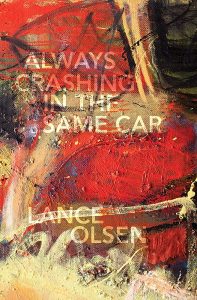Reviewed by Hayley Green

David Bowie left an unforgettable mark on this world. Even after his death, he is still inspiring others to this day, including the notable Lance Olsen. An established author, this endeavor was not his first, having published some twenty-eight novels before, with topics ranging from nonfiction to fiction and even some prose-writing advice works. The author wrote Always Crashing in the Same Car: A Novel After David Bowie and it was subsequently published in February of 2023, even though David Bowie passed on January 10, 2016. The author captures David Bowie’s raw emotions and tempered thoughts both as a young man and as an aging, then dying, sixty-nine year-old.
David Bowie was just a stage name, one to differentiate himself from the ever-growing world of musicians in the sixties. His real name was David Robert Jones, which is arguably an average, notably tame moniker for a rockstar. He popularized himself under his birth name for some time, but then it became apparent that his given name would never stick. Competing with the likes of Davy Jones, who became famous for his role in The Monkees, outgrew our David Robert Jones, and thus, David Bowie was born; however, identity for David Bowie was a fluid mechanic and he explored many versions of himself during his career.
We meet Aladdin Insane, Ziggy Stardust, and more on this journey with David Bowie and how some of these characters came to be, but the most important character of this novel is David Robert Jones. Yes, the original man, the one and only, because the pondering over oneself and one’s past was always in question, and it never was completely answered. Having reinvented himself on every other Tuesday, the aesthetics were for press attention, yet the function of these identities produced an exploration of self that became his only consistent measure. David Bowie himself is repeatedly mentioned as “the man” in Lance Olsen’s vernacular, and that was the best way in which to properly discuss a person of so many colors.
The philosophy of self, I will call it, is what speaks so strongly throughout this novel. Who is David Bowie (David Robert Jones)? And how did his life lead him to make such daring choices along the way? Lance Olsen allows such speculation to run wild in such beautiful ways. Reading as prose poetry bound into the form of a novel, such intricate and heavy topics, like identity, relationships with loved ones, and the legacy one leaves behind, and treated with such finesse. Lance Olsen gives his all to this novel, and he leaves the reader with an impression that David Bowie was not just a man, but a myth and a legend. He does not remove the damaged parts of Bowie and relegate them to some lost place, but he presents the perpetual questioning of Bowie and the world with sympathy and without distortion.
It is certain that David Bowie will remain in the public consciousness for some time, maybe forever, like Elvis, and this novel provides the worldly cement necessary for this to happen. Lance Olsen gives ample page-space to the social impact of David Bowie’s music and character(s) and makes no uncertain declarations about David Bowie’s sexuality and religious preferences. Bowie pioneered the androgynous glam-rock figure, one that shook and hooked American audiences, to great success; he flaunted his sexuality and was coolly unaffected by anyone’s criticism. Audiences mirrored him, not only in looks and in fashion, but to the very core of their social and political ambitions, deciding that they would crown him as their king of socialized movement. Unprecedented is an accurate way to categorize this impact, but legendary captures the long-term impact of such a person.
This novel, Always Crashing in the Same Car: A Novel After David Bowie by Lance Olsen, is worth one’s time. It is a work that will stay with you far after you finish the last page, and the lingering philosophical questioning will color your own thoughts. The journey through time and place and character is absolutely centered on David Bowie’s life and career, but the exploration of identity and desire, in Lance Olsen’s hands, is a method of review that would be valuable in any circumstance.
*Both UA Press and Call Me [Brackets] are affiliated with the University of Alabama in Tuscaloosa, AL
